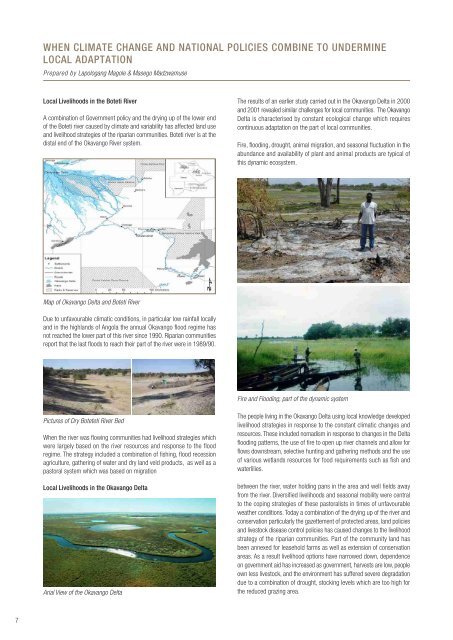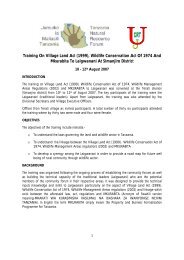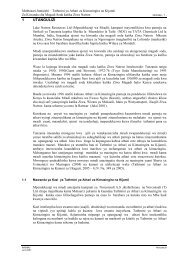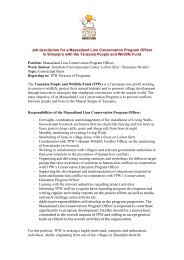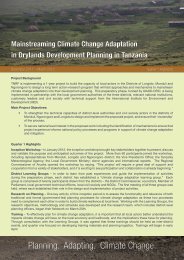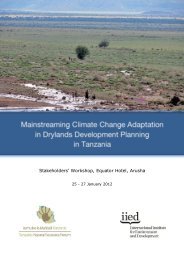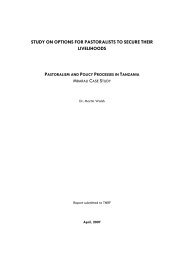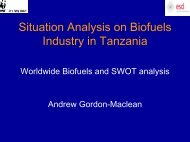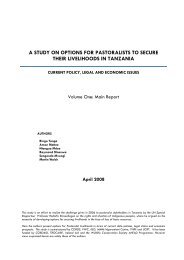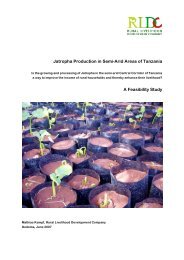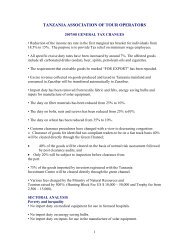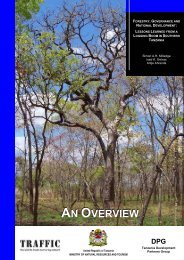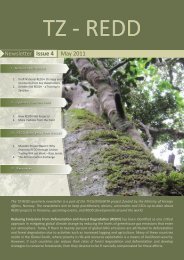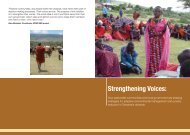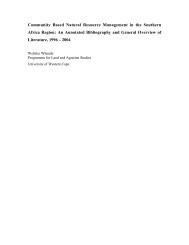DISPATCHES ON ADAPTATION
Dispatches_on_Adaptation - Tanzania Natural Resource Forum ...
Dispatches_on_Adaptation - Tanzania Natural Resource Forum ...
- No tags were found...
You also want an ePaper? Increase the reach of your titles
YUMPU automatically turns print PDFs into web optimized ePapers that Google loves.
WHEN CLIMATE CHANGE AND NATI<strong>ON</strong>AL POLICIES COMBINE TO UNDERMINE<br />
LOCAL ADAPTATI<strong>ON</strong><br />
Prepared by Lapologang Magole & Masego Madzwamuse<br />
Local Livelihoods in the Boteti River<br />
A combination of Government policy and the drying up of the lower end<br />
of the Boteti river caused by climate and variability has affected land use<br />
and livelihood strategies of the riparian communities. Boteti river is at the<br />
distal end of the Okavango River system.<br />
The results of an earlier study carried out in the Okavango Delta in 2000<br />
and 2001 revealed similar challenges for local communities. The Okavango<br />
Delta is characterised by constant ecological change which requires<br />
continuous adaptation on the part of local communities.<br />
Fire, flooding, drought, animal migration, and seasonal fluctuation in the<br />
abundance and availability of plant and animal products are typical of<br />
this dynamic ecosystem.<br />
Map of Okavango Delta and Boteti River<br />
Due to unfavourable climatic conditions, in particular low rainfall locally<br />
and in the highlands of Angola the annual Okavango flood regime has<br />
not reached the lower part of this river since 1990. Riparian communities<br />
report that the last floods to reach their part of the river were in 1989/90.<br />
Fire and Flooding, part of the dynamic system<br />
Pictures of Dry Boteteti River Bed<br />
When the river was flowing communities had livelihood strategies which<br />
were largely based on the river resources and response to the flood<br />
regime. The strategy included a combination of fishing, flood recession<br />
agriculture, gathering of water and dry land veld products, as well as a<br />
pastoral system which was based on migration<br />
Local Livelihoods in the Okavango Delta<br />
Arial View of the Okavango Delta<br />
The people living in the Okavango Delta using local knowledge developed<br />
livelihood strategies in response to the constant climatic changes and<br />
resources. These included nomadism in response to changes in the Delta<br />
flooding patterns, the use of fire to open up river channels and allow for<br />
flows downstream, selective hunting and gathering methods and the use<br />
of various wetlands resources for food requirements such as fish and<br />
waterlilies.<br />
between the river, water holding pans in the area and well fields away<br />
from the river. Diversified livelihoods and seasonal mobility were central<br />
to the coping strategies of these pastoralists in times of unfavourable<br />
weather conditions. Today a combination of the drying up of the river and<br />
conservation particularly the gazettement of protected areas, land policies<br />
and livestock disease control policies has caused changes to the livelihood<br />
strategy of the riparian communities. Part of the community land has<br />
been annexed for leasehold farms as well as extension of conservation<br />
areas. As a result livelihood options have narrowed down, dependence<br />
on government aid has increased as government, harvests are low, people<br />
own less livestock, and the environment has suffered severe degradation<br />
due to a combination of drought, stocking levels which are too high for<br />
the reduced grazing area.<br />
7


